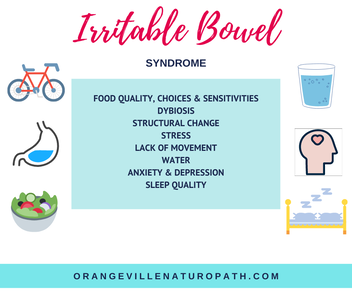Symptoms of IBS
- abdominal pain or cramping
- bloating and gas
- diarrhea or constipation, or both
- mucus in the stool (not blood)
- fatigue
- food sensitivity
- poor sleep quality
- often correlated with anxiety & depression
So what's my approach?
Many of my patients have exhausted other resources, only to have been told that they have IBS and to live with it. Perhaps they've been given Align, or it's been suggested to watch dairy consumption, lower stress levels and eat more fibre (which gets interpreted as Bran Buds), but that's usually the extent of it.
There is so much more we can do!
To understand IBS and how to heal it, we need to go back and understand the digestive system. The process of taking in, breaking down food, absorbing nutrients, and eliminating wastes is quite complex. Most NDs, including me, will acknowledge that digestive function is at the root of most health issues - it's that important.
Crucially, we must also acknowledge the relationship between mental-emotional health and digestive function. The gut is intensely innervated (connected to the brain via nerves), and also communicates with us via hormones. Did you know that 70-80% of serotonin - the happy molecule - is actually MADE in the gut. So, if your digestive tract isn't happy, you won't be happy.
Furthermore, the bacteria and other microbes that live in the digestive tract dictate all sorts of body functions, support the immune system, are involved in nutrient production, and impact the blood-brain-barrier. As well, the incredible amount of surface area of our digestive tract means that the position and structure of the organs, fascia, lymphatics, and other tissue are quite important as well. For example, if you have scar tissue from surgery the ability for things to move through the gut in that area can be impacted.
So, what's a normal bowel movement?
Information about our digestive health comes from understanding our stool. Most of us don't like or aren't used to talking about our bathroom habits, but it provides huge insight into our digestive function and overall health. Ideally, we would have 1-3 bowel movements each day, and the stool would be soft, but well-formed in the shape of a sausage. Anything that deviates from this description can give us clues about what might be out of balance.
A stool with cracks or that comes out in small bits could indicate dehydration or a lack of fibre. A stool that seems rough or fluffy often points to inflammation. People with IBS often have alternating loose stools or constipation, mucus in the stool, indigested food, and stress or lots of time spent thinking about or planning their bathroom time.
If you have blood, black tarry, or grey stool we need to consider other diagnoses.
I have IBS, what can I do?
Once we appreciate your unique health story we can understand how to return balance by addressing your symptoms for immediate relief, and also the root cause in order to stay well.
Here are some of the strategies that I might suggest:
- Sleep routine
- Stress management
- Identifying which foods serve you, and which are triggers
- food sensitivities (commonly dairy, wheat)
- adequate fibre -> I like flax & chia seeds over wheat bran
- peppermint tea and oil can be helpful
- sometimes low FODMAP, or low sugar
- being mindful of caffeine and alcohol - Balancing the microbiome (e.g. probiotics)
- occasionally this warrants functional stool testing to assess the bacteria and look for parasites or yeast - Daily movement
- walking - Hydration
- Structural manipulation (often with referral to an Osteopath)
- Acupuncture
- Addressing anxiety & depression
- Digestive support like enzymes, apple cider vinegar, bitter herbs
- Peppermint or chamomile tea for soothing
Clearly, there is a lot that can be done to determine the cause and stimulate healing of the digestive system. Canada actually has high prevalence of IBS compared to the rest of the world, with about 18% of the population being affected at any one time. Over 5 million people might be impacted, but the exact numbers are difficult to obtain because there is huge variation in the number of people that report symptoms of IBS versus the number of people with a definitive diagnosis (1). Even more impactful is the reported difference to quality of life in those with IBS. 70% of IBS sufferers report that their symptoms interfere with their daily lives - including missing work or school and experiencing fatigue or pain (2).
One thing to note is that in children, anxiety, depression and stress often present as digestive symptoms.
It's important to recognize that you don't need to suffer in silence. You deserve better. You deserve health.
With encouragement,
Dr. Christa
P.S. April was IBS Awarness month... so I'm a little late. haha
1. https://www.ncbi.nlm.nih.gov/pmc/articles/PMC3352839/
2. https://cdhf.ca/digestive-disorders/irritable-bowel-syndrome-ibs/statistics/

 RSS Feed
RSS Feed